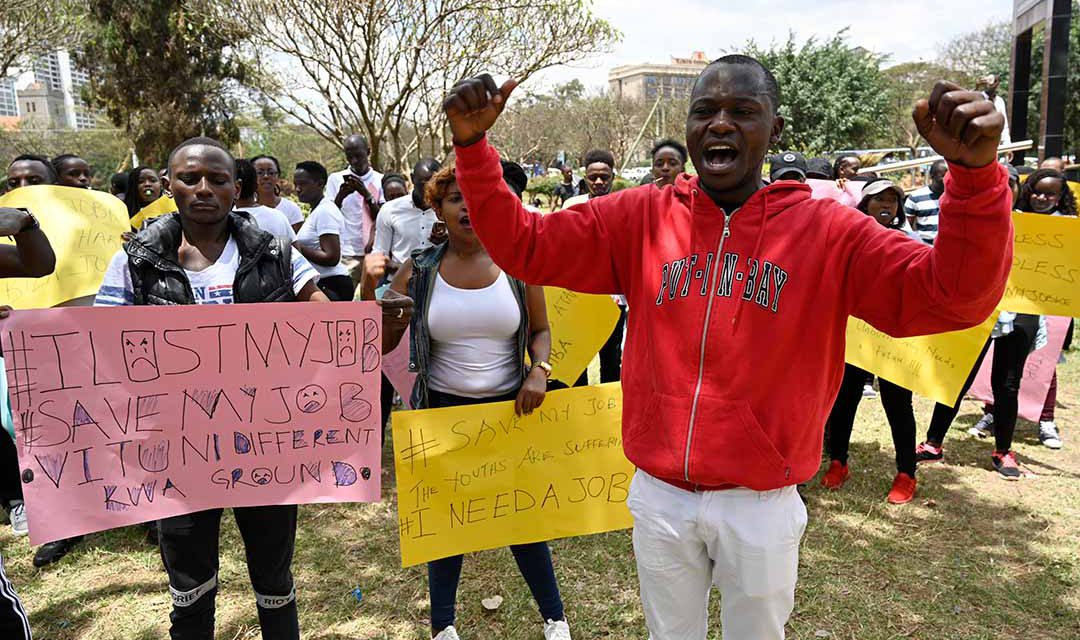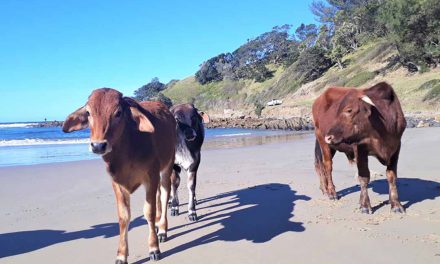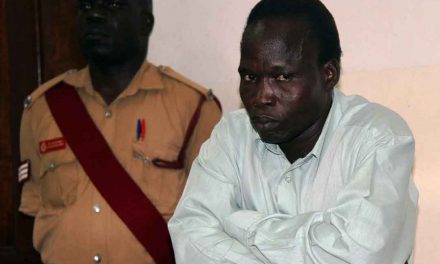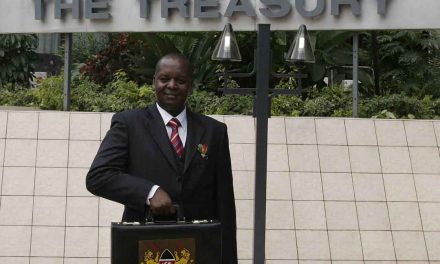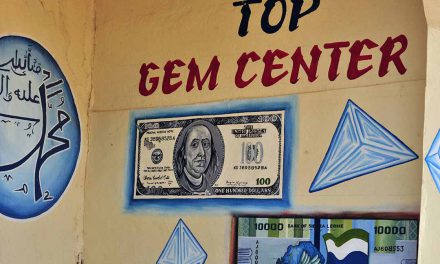Peace and security: youth
Young people must be at the centre of all of Africa’s plans and processes to create sustainable peace and development
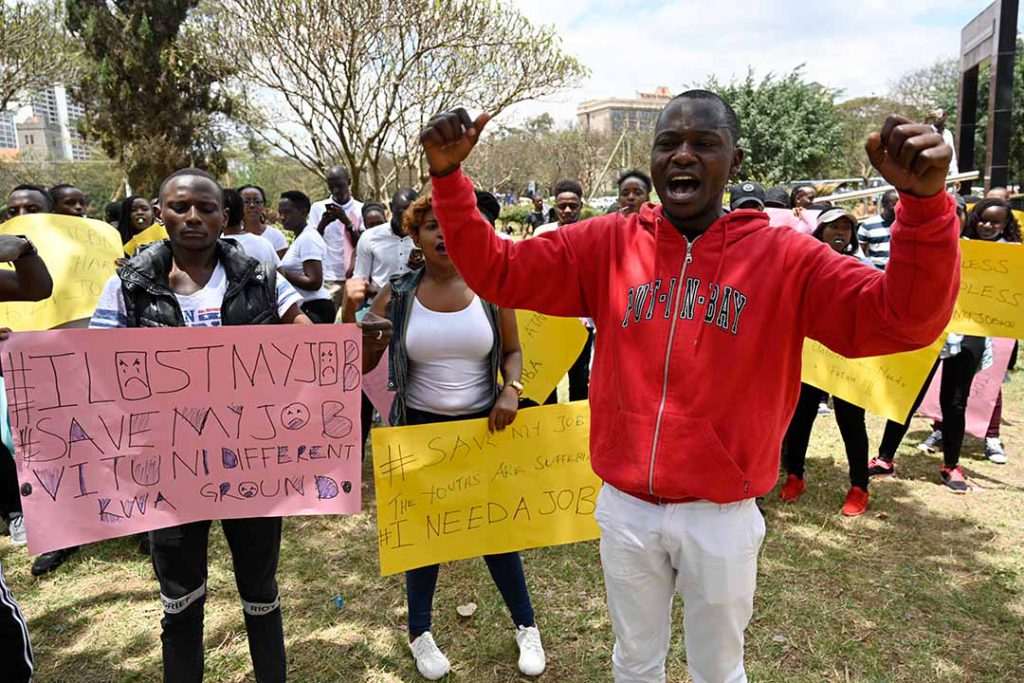
AA group of activists demonstrate against unemployment in Nairobi, Kenya in October 2019. A lack of jobs, especially for youth, has slowed down the economy to a point where unemployed adults depend on a small working-class group. Photo: SIMON MAINA / AFP
In 2015 the UN Security Council adopted resolution 2250, which recognises the critical, positive role of young people in peace and security. The resolution reinforces the need for their active participation and engagement in peace initiatives and the formulation of inclusive policies towards achieving sustainable peace. Resolution 2250 is the first such resolution fully dedicated to the important role youth play in the promotion of peace and security; it recognises the role of young people in security processes, integrated into five pillars: participation, protection, prevention, partnership, disengagement and reintegration. Additionally, in 2016, to recommend effective responses at the local, national, regional and international levels, then-UN Secretary General Ban Ki-Moon commissioned an independent study on youth, peace and security. The study report titled, ‘The Missing Peace’, which is considered a blueprint for implementing resolution 2250, proposed ways of supporting youth-led, peacebuilding processes.
It offered insights into inclusive approaches that could be used to engage youth in peace and security, recognising young people as an indispensable asset in building lasting peace in societies rather than as a challenge or a problem. The UN Department of Economic and Social Affairs is the UN agency responsible for supporting and monitoring the implementation of the UN World Programme of Action for Youth, adopted by the General Assembly in 1995 and broadly reflected in the 2030 Agenda for Sustainable Development. Currently, UNDESA is working with UN partners, the commonwealth secretariat, governments, the private sector, nongovernmental organisations, youth-led networks and others to ensure that the contribution of young people in advancing peace and security as espoused in resolution 2250 is fully recognised and supported. In Kenya, for example, UNDESA is collaborating with the government and members of the UN country team on implementing a project aimed at promoting sustainable peace through national youth policies within the framework of the Sustainable Development Goals (SDGs).
Since the 2010 promulgation of the Kenyan Constitution, the country has introduced initiatives aimed at consolidating democratic processes to achieve accountable, inclusive and participatory democracy. In 2016, the government initiated a review process of the Kenya National Youth Policy to align it to the 2010 Constitution and factor in new and emerging youth challenges and opportunities. The reviewed national youth policy has key provisions on youth peace and security, recognising that peace, security and sustainable development can only be achieved by comprehensively tackling issues that affect young people and involving them as stakeholders and decision makers. Kenya is a youthful nation: almost 80% of the population is aged 35 years and younger, and including them as stakeholders in community-driven security and peace building initiatives is vital. As the largest proportion of the community, young people are often the main cause, and victims, of crime and conflict.
They are an integral part of society and it is important to give them a sense of responsibility and belonging by ensuring that they take a lead role in matters that most affect them. Youth-led and youth-based peace-building organisations should therefore be included in promoting a culture of peace, by contributing to achieving SDG 16 on peace, stability and human rights. Kenya faces complex and longstanding conflicts. Many proposed solutions to these have been tried and they have not worked as they should. But through the UNDESA project, young Kenyans have come up with innovative ways to prevent conflict in their communities, reconstruct and restore social fabric, and to heal and pursue socioeconomic transformation. The project has enabled young people, drawing on both their fresh ideas as well as the experience of adults, to propose innovative and new approaches to dealing with numerous peace and security related problems, including exclusion, marginalisation, inequality and poverty, among others.
For example, TT, a Hip-Hop artist, is using art and culture to promote peace and security through his initiative, wacha gun shika mic (drop the gun and grab the mic), which targets vulnerable youth living in high-risk areas to leave crime and drugs and promote peace and security. The project has created a platform for young people to learn, share and engage to become effective peace builders in their communities. Although there is still a long way to go and much more work to be done, such innovative approaches to peace and security seem to be working, and more young people are encouraged and empowered to come up with more creative and innovative ideas. Christine Odera, the national coordinator of the Commonwealth Youth Peace Ambassadors Network (CYPAN) is passionate about addressing violent extremism, and through her project, A Legacy of Prevention, she’s building on knowledge gaps previously identified in the prevention and countering violent extremism (PVE) in Kenya.
The project is developing locally informed knowledge that can aid communities to prevent and counter violent extremism, and meaningfully contribute to peace and stability in their areas. Youth, and their perspectives, are important not only to the success of CVE programmes, but also to the broader processes of conflict transformation and sustaining peace. Youth have to be the central focus of CVE if governments and civil society want to halt recruitment into violent extremist groups. Javan Ofula, a young activist and a poet, is running community justice centres – an innovative approach to legal empowerment that places the community at its heart, decentralising legal empowerment initiatives to enhance access to justice for poor and marginalised communities. Stanley Ogolla is the coordinator of The Youth Congress, an organisation that promotes leadership and participation in governance and development.
The organisation uses sports to mobilise young people, to bridge relationships across social, economic and cultural divides in communities, and to develop a sense of shared identity among groups that might otherwise treat each other with hostility or violence. The Youth Congress also runs programmes that offer young people opportunities for education, employment and political participation. The aim is to give them more life opportunities, reducing their vulnerability to possible radicalisation and recruitment into violent extremist groups. There are also other new ideas such as the Members of County Assembly Youth Caucus, a platform developed by young members of local government to enable them to champion issues of major concern to young people, including peace and security. One of the group’s initiatives is a caucus to create awareness of Resolution 2250 and to advocate for youth engagement on peace and security processes.
In Kenya, it is encouraging to see this and other innovations by young people that are helping to accelerate peace and security in the country, and hopefully they might soon be replicated elsewhere in Africa and beyond. An important factor is that these initiatives are youth led and they have created mutually beneficial partnerships. As we continue to strive for sustainable peace and development in Africa, youth must be at the centre of all the plans and processes. Initiatives must be smarter, innovative and youth driven to achieve peace and development objectives.
Raphael Obonyo is a public policy analyst. He’s served as a consultant with the UN Department of Economic and Social Affairs (UNDESA). An alumnus of Duke University, he has authored and co-authored numerous books, including Conversations about the Youth in Kenya (2015). He is a TEDx fellow and has won various awards.

